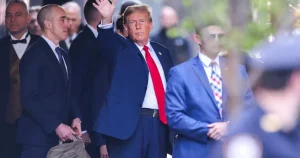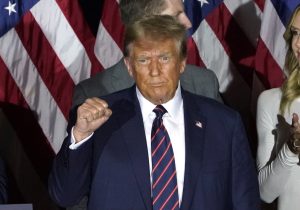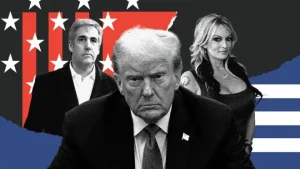
Costa Tropical Internet
Just another WordPress site
The summer of 2020 was a particularly tumultuous one for the United States, with many referring to it as “The Trump Trials: A Cruel Summer.” This was a period marked by sweeping social unrest, an uncontrolled pandemic, and an escalating political feud that culminated in the impeachment and subsequent acquittal of President Donald Trump. The stress of these events on the American populace was palpable, as national debates raged over the efficacy of the president’s actions, his moral character, and the larger implications for American democracy.
The unyielding heat of the season mirrored the intensity of the political climate, with Trump’s administration under intense scrutiny. The president’s actions and policies were put under the microscope, triggering an avalanche of criticism, support, and everything in between. Revelations from books such as “Too Much and Never Enough” by Mary L. Trump and “Rage” by Bob Woodward added fuel to the fire, stirring up more controversy and debate.
The pandemic also played a significant role in the summer trials. The administration’s handling of the COVID-19 crisis became a hot-button issue, with critics accusing the president of downplaying the virus’s severity and failing to implement an effective strategy to curb its spread. The high infection and death rates in the U.S compared to other developed countries presented a stark picture of a nation in crisis.
The Black Lives Matter protests, sparked by the deaths of George Floyd and other African Americans at the hands of law enforcement, also weighed heavily on the summer trials. The president’s divisive rhetoric and response to the protests led to widespread criticism, further polarizing the country and raising questions about the state of race relations and social justice in the U.S.

The impeachment trial, which occurred earlier in the year, was still a significant talking point during the summer. The president’s acquittal by the Senate on charges of abuse of power and obstruction of Congress did not put the issue to rest. Instead, it continued to be a source of contention, with some viewing it as a vindication of the president, while others saw it as an endorsement of questionable conduct.
The economic fallout from the pandemic was also a key aspect of the summer trials. Millions lost their jobs, businesses shuttered, and the stock market fluctuated wildly. The president’s economic policies and stimulus measures were scrutinized and debated as the country grappled with a deepening recession.
All these elements combined to create a summer of trials for President Trump, a cruel season that tested his leadership and the resilience of the American people. It was a time of intense scrutiny, deep divisions, and significant challenges, setting the stage for a contentious election season. This summer will be remembered as a critical period in American history, with the events and decisions made during this time likely to shape the nation’s future for years to come.
As the mercury rises, so too does the intensity of the courtroom battles that are taking shape across the nation. This summer promises a series of high-stake confrontations within the hallowed halls of justice, destined to leave lasting impacts on society. At the heart of the drama are contentious issues: corporate misconduct, civil rights infringements, political corruption, and much more. These cases, each carrying significant societal implications, will be fought tooth and nail, with every ounce of wit, strategy, and evidence that the parties can muster.
High-profile litigants, from corporate titans to political figures, are bracing for a summer of grueling legal wrangles that could possibly reshape public opinion and potentially rewrite the rules of the game. The stakes are high, the pressure immense, and the outcome uncertain. The drama is further amplified by the media spotlight, casting a harsh glare on every move, every argument, and every judgment.
These impending battles are not just about winning or losing; they are about setting precedents, influencing regulatory norms, and shaping societal values. The courtroom, in this context, becomes much more than a venue for adjudication; it becomes a battleground for change, a platform for airing grievances, and a catalyst for reform.
As the summer heat intensifies, so will the fervor of these battles. The nation watches with bated breath as each case unfolds, dissecting each argument, analyzing each tactic, and predicting each outcome. In a sense, these high-stake courtroom dramas encapsulate the very essence of democracy: the struggle for justice, the pursuit of truth, and the power of the collective voice.
So, as the sun blazes down on us this summer, prepare for an equally heated spectacle within the cool confines of the courtroom. It’s a summer that promises to be remembered not just for its relentless heat but for its relentless pursuit of justice. Let the legal dramas commence!

Key witnesses and evidence play a pivotal role in shaping the outcome of any court proceedings. Their testimonies have the power to change the course of an investigation, revealing hidden truths and shedding light on obscured facts. The testimonies of these key witnesses often function as a linchpin, holding together the entirety of a case. They provide the necessary pieces in the puzzle that investigators, juries, and judges need to form a complete and accurate picture of the events that occurred.
Moreover, evidence, whether physical or digital, serves as an indelible record of facts. It can confirm or refute the statements made by these witnesses, adding another layer of depth to a case. Evidence can range from tangible items, such as objects found at a crime scene, to intangible ones, including digital footprints and phone records.
In many situations, the witness testimonies and evidence complement each other, creating a comprehensive narrative that helps the jurors and judges make informed decisions. However, there can be instances where they contradict, leading to more complex and intriguing scenarios.
Analyzing the significance of key witnesses and evidence involves meticulous attention to detail and careful interpretation. Investigators and attorneys must scrutinize every piece of testimony and evidence, strategically using them to build or dismantle a case. It’s a delicate balance to maintain, as misinterpretations can lead to miscarriage of justice.
In the end, the critical testimonies of key witnesses, coupled with the irrefutable presence of evidence, can be the difference between resolution and uncertainty in court proceedings. They are the pillars that support the intricate process of determining the truth, delivering justice, and maintaining societal order. The importance of these elements cannot be overstated, and their role in the justice system continues to be a topic of in-depth study and discussion.
The ongoing trials are significantly influencing national opinion, stirring public sentiment and encouraging widespread discourse. This is largely due to the spotlight they have garnered, both from mainstream media and social media platforms. As the details of these cases unfold, citizens across the nation are forming opinions, not just on the trials themselves, but also on the broader issues they represent. It is interesting to observe that people’s reactions are not solely influenced by the specifics of the cases. Instead, they are often shaped by personal beliefs, political affiliations, and perceived societal norms. A palpable divide is visible, with some citizens viewing the trials as a necessary measure to uphold justice and maintain societal order, while others perceive them as an overreach of authority, infringing upon individual rights.
This divergence in opinion is causing heated debates and discussions, further fuelling the fire of divided sentiments. Consequently, these trials are not just determining the fate of those involved, but are also shaping how citizens perceive their nation’s justice system, its fairness and its transparency. Moreover, these trials are prompting the public to question the efficacy of the existing judicial process and its ability to serve the interests of all citizens. The public reaction, thus, is a reflection of people’s faith, or lack thereof, in the system. It is clear that the trials are acting as a catalyst, provoking public thought, driving conversations and reshaping national opinion. They are pushing people to consider the balance between justice, authority, and individual rights. The trials are, therefore, not merely legal proceedings but a mirror reflecting the state of the nation’s collective thought and belief.

Media coverage has played a significant role in shaping public perception of the Trump trials. The press, in its multifaceted role as an informer, watchdog, and interpreter, has greatly influenced the understanding and discourse surrounding these high-profile proceedings. The constant barrage of information from news outlets, often characterized by divergent narratives and polarizing viewpoints, has both informed and misled audiences, intensifying the political polarization in the country.
On one hand, the press has served as a critical source of information, shedding light on the intricacies of the trials, the allegations levelled, and the legal implications. They have relayed events as they unfolded, providing the public with a play-by-play of the developments. On the other hand, the media has also been accused of sensationalism, bias, and a lack of objectivity. Depending on the political leanings of a particular outlet, the coverage has been accused of either being overly critical or excessively lenient towards Trump.
In-depth analysis of the press’s role in the Trump trials also underscores the power of the media in shaping narratives. The way information is presented, the language used, and the aspects emphasized, all influence public opinion. The media can amplify certain aspects of the trials, while downplaying or ignoring others, thereby controlling the narrative.
Despite criticisms, the media’s role in the Trump trials has been undeniably significant. It has brought the trials into the living rooms of millions of Americans and sparked widespread debates and discussions. As the fourth pillar of democracy, the media has a responsibility to report accurately and objectively. However, in the era of extreme political polarization and ‘fake news’, achieving this ideal seems more challenging than ever. In the end, the media’s role in the Trump trials is a mirror reflecting its broader role in modern society – informing, interpreting, and influencing public opinion while navigating the complex landscape of politics, bias, and public sentiment.